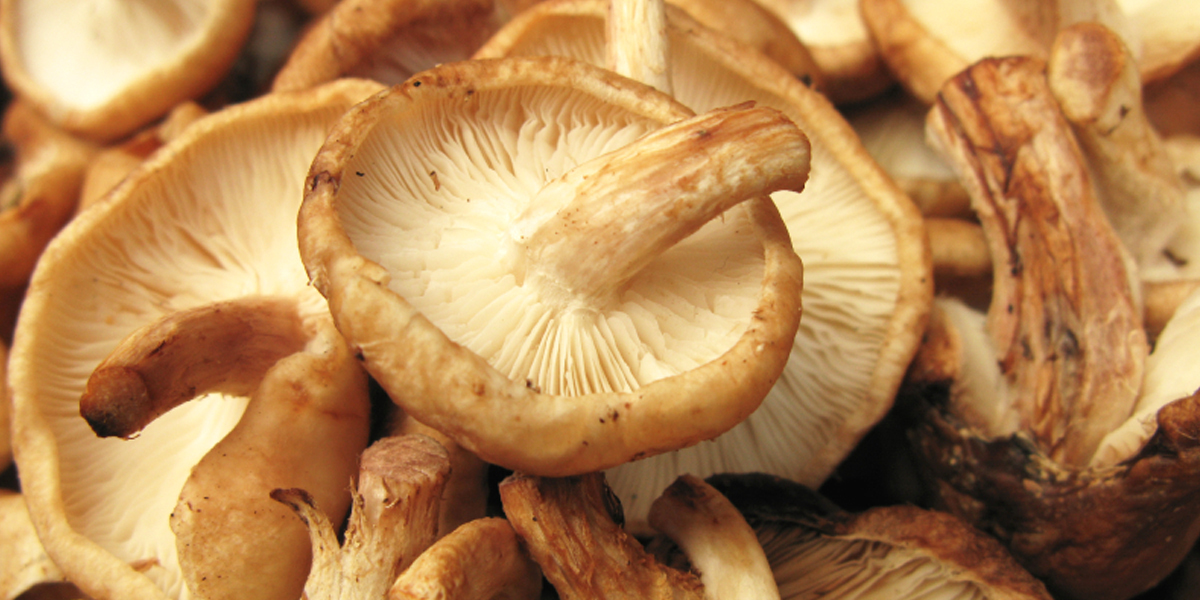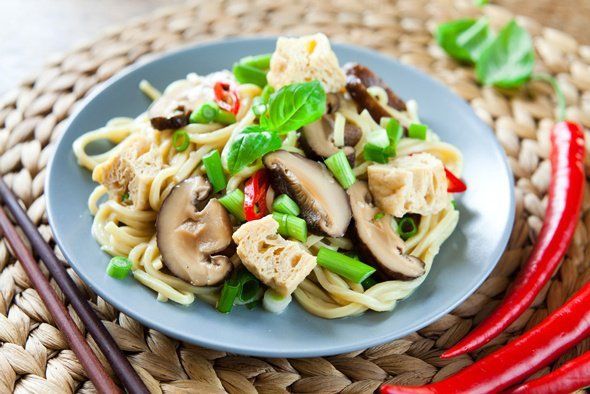

iStock
By Kerri-Ann Jennings
Shiitake mushrooms are one of the most popular mushrooms worldwide.
They are prized for their rich, savory taste and diverse health benefits.
Compounds in shiitakes may help fight cancer, boost immunity and support heart health.
This article explains everything you need to know about shiitake mushrooms.
What Are Shiitake Mushrooms?
Shiitakes are edible mushrooms native to East Asia.
They’re tan to dark brown in color and the caps usually grow to between 2 and 4 inches (5 and 10 centimeters).
While typically used as vegetables, shiitakes are actually a fungus that grows naturally on decaying hardwood trees.
They’re also widely grown. Eighty-three percent of shiitakes are grown in Japan, although the U.S., Canada, Singapore and China also produce them (1).
You can find them fresh, dried or in various dietary supplements.
Bottom Line: Shiitake mushrooms are brown-capped mushrooms used around the world for food and as supplements.
Nutrition Profile of Shiitake Mushrooms
Shiitakes are low in calories. They also offer good amounts of fiber, as well as B vitamins and some minerals.
Here are the nutrients you get in four dried shiitakes (15 grams) (2):
- Calories: 44.
- Carbs: 11 grams.
- Fiber: 2 grams.
- Protein: 1 gram.
- Riboflavin: 11 percent of the RDI.
- Niacin: 11 percent of the RDI.
- Copper: 39 percent of the RDI.
- Vitamin B5: 33 percent of the RDI.
- Selenium: 10 percent of the RDI.
- Manganese: 9 percent of the RDI.
- Zinc: 8 percent of the RDI.
- Vitamin B6: 7 percent of the RDI.
- Folate: 6 percent of the RDI.
- Vitamin D: 6 percent of the RDI.
In addition, shiitakes contain many of the same amino acids as meat (3).
They also contain polysaccharides, terpenoids, sterols and lipids linked to immune-boosting, cholesterol-lowering and anti-cancer effects (4).
All of these properties can differ, depending on how and where the mushrooms are grown, stored and used (3).
Bottom Line: Shiitake mushrooms are low in calories. They also offer many vitamins, minerals and other health-promoting compounds.
How Are They Used?
Shiitake mushrooms have two main uses: as food and as supplements.
Shiitakes as Whole Foods
You can cook with both fresh and dried shiitakes, although the dried mushrooms are slightly more popular.
Dried shiitakes have an umami flavor that’s even more intense than when they’re fresh.
Umami means savory and delicious. It is described as the “fifth taste” along with sweet, sour, bitter and salty.
Both dried and fresh shiitake mushrooms are used in stir-fries, soups, stews and other dishes.
Shiitakes as Supplements
Shiitake mushrooms have long been used in traditional Chinese medicine.
They’re also part of the medical traditions of Japan, Korea and Eastern Russia (4).
In Chinese medicine, shiitakes are thought to boost health and longevity, as well as improve circulation.
Modern studies have found shiitake mushrooms’ bioactive compounds may offer some protection against cancer and inflammation (4).
However, many of the studies have been done with lab animals or in test tubes, rather than with humans.
In addition, many of the mushroom-based supplements on the market have not been tested to determine how well they work (5).
Although the proposed benefits are promising, you should consider them with a grain of salt.
Bottom Line: Shiitakes have a long history of use, both as food and in medicinal supplements.
They Could Help Your Heart
Shiitake mushrooms may have several benefits for heart health. For example, they have three compounds that may help lower cholesterol:
- Eritadenine: A compound that inhibits an enzyme involved in producing cholesterol (3).
- Sterols: Molecules that help block cholesterol absorption in your gut (6).
- Beta-glucans: A type of fiber that can lower cholesterol (7).
One study of rats with genetically high blood pressure found that shiitake mushroom powder prevented an increase in blood pressure (8).
Beyond its individual components, shiitakes may be heart-healthy as a whole food.
A study in lab rats fed a high-fat diet found that those given shiitake mushrooms developed less fat in their livers, less plaque on their artery walls and had lower cholesterol levels than those who didn’t get any mushroom supplement (9).
Bottom Line: Several compounds in shiitakes help lower cholesterol and may keep plaque from sticking to artery walls.
They May Boost Your Immune System
Shiitakes may also help strengthen your immune system.
A 2015 study had people eat around two dried shiitakes daily for a month. Overall, their immune markers improved. They also had less inflammation than before the study began (10).
This immune effect might be due in part to one of the polysaccharides found in shiitake mushrooms (11).
Additionally, your immune system gets weaker with age. However, a mouse study found that a supplement derived from shiitakes helped reverse some of the age-related decline in immune function (12).
Bottom Line: Eating shiitake mushrooms regularly may help bolster your immune system and reduce age-related decline in immune function.
They Have Compounds Used to Fight Cancer
Polysaccharides in shiitake mushrooms may also have an anti-cancer effect (13, 14).
For example, the polysaccharide lentinan helps fight tumors by activating the immune system (15, 16).
Lentinan has been shown to inhibit the growth and spread of leukemia cells (17).
In China and Japan, an injectable form of lentinan is used alongside chemotherapy and other major cancer treatments to improve immune function and quality of life in people with gastric cancer (18, 19).
However, there’s not enough evidence to say whether actually eating shiitake mushrooms has any effect on cancer.
Bottom Line: Lentinan is a polysaccharide in shiitake mushrooms that may help fight cancer.
More Benefits of Shiitakes
Shiitake mushrooms may also help fight germs and promote bone health.
They Have Promising Antibacterial and Antiviral Effects
Several compounds in shiitakes have antibacterial, antiviral and antifungal effects. These include oxalic acid, lentinan, centinamycins A and B (antibacterial) and eritadenine (antiviral) (18, 20).
In the face of growing antibiotic resistance, some scientists think it’s important to explore the antimicrobial potential of shiitakes (21).
They May Help Strengthen Your Bones
Mushrooms are the only natural plant source of vitamin D.
Your body needs vitamin D to build strong bones, yet very few foods contain this important nutrient.
The vitamin D levels of mushrooms vary, depending on how they are grown. When exposed to UV light, they develop higher vitamin D levels.
In one study, mice fed a low-calcium, low-vitamin D diet developed symptoms of osteoporosis. In comparison, those given calcium and UV-enhanced shiitake mushrooms had higher bone density (22).
However, keep in mind that shiitakes contain vitamin D2. This is an inferior form of the vitamin compared to vitamin D3, which is found in fatty fish and some other animal foods.
Bottom Line: Compounds in shiitake mushrooms have antimicrobial properties. Eating shiitakes with higher vitamin D levels may improve your bone density.
Possible Side Effects of Shiitakes
Most people can safely consume shiitakes, although some side effects may occur.
In rare cases, people can develop a skin rash from eating or handling raw shiitakes (23).
This condition, called “shiitake dermatitis,” is thought to be caused by lentinan (24).
In addition, using powdered mushroom extract over a long period of time may cause some side effects. These include stomach upset, sensitivity to sunlight and shiitake dermatitis (25, 26).
Some also claim that eating mushrooms can cause symptoms in gout sufferers due to their high purine content. However, research suggests that eating mushrooms is linked to a lower risk of gout (27).
Bottom Line: Shiitakes may cause some side effects, such as a skin rash. Shiitake mushroom extract may also cause digestive problems and increased sensitivity to sunlight.
How to Cook With Shiitakes
Mushrooms have an umami flavor, offering a savory base note to dishes. This can be especially helpful when making vegetarian dishes.
Shiitake mushrooms are often sold dried. You can soak them in hot water, soften them and then cook with the mushrooms and mushroom water.
To select the best dried shiitake mushrooms, look for ones that are sold whole, rather than sliced. The caps should be thick, with deep, white fissures.
You can find excellent tips on selecting, prepping and cooking with dried shiitake mushrooms in this article.
When cooking with fresh shiitake mushrooms, remove the stems, which remain tough even after cooking. Save the stems in the freezer for making veggie stock.
You can cook with shiitakes as you would any other mushroom. Here are a few suggestions:
- Sauté shiitakes with greens and serve with a poached egg.
- Add them to pasta dishes or stir-fries.
- Use them to make a flavorful soup.
- Roast them for a crispy snack or side dish.
Bottom Line: You can cook with either rehydrated, dried or fresh shiitake mushrooms. They add a delicious, savory flavor to foods.
Take Home Message
Shiitakes have a long history of use, both as food and as medicinal supplements.
While the research on the health benefits of shiitake mushrooms is promising, very few human studies have been conducted.
However, shiitakes are low in calories and contain many vitamins, minerals and bioactive plant compounds.
At the end of the day, they’re an excellent addition to your diet.
Reposted with permission from our media associate Authority Nutrition.

 233k
233k  41k
41k  Subscribe
Subscribe 
